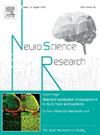透明和不透明德语单词打字错误的事件相关脑电位。
IF 2.4
4区 医学
Q3 NEUROSCIENCES
引用次数: 0
摘要
打字中的错误检测对于评估正在进行的操作是否适当至关重要,它既可利用预测机制进行早期检测,也可利用感觉反馈进行晚期检测。神经生理学研究支持通过预测模型来预测错误。这项研究扩展了对打字错误检测的理解,重点研究了透明和不透明德语单词错误的神经认知机制。36 名志愿学生在电脑键盘上输入了听觉呈现的单词,这些单词被分为正字法透明和不透明两种,且不可能进行纠正。由于拼写不清或人工痕迹过多,最终样本由 27 名参与者组成。研究人员采集了与按键时间相关的事件相关电位(ERP),并收集了有关打字正确率和速度的行为数据。结果发现,与透明词语相比,不透明词语的错误率更高,延迟时间更长,这表明拼写的复杂性会影响打字的正确性。同时还观察到出错后的速度减慢,这与出错后认知控制能力的增强相一致。ERPs显示了与输入错误相关的负性(ERN)相似的负性成分,在按下错误的按键之前有明显的类似ERN的负性,特别是对于不透明的单词。这项研究为打字错误的认知和神经机制提供了证据,突出了正字法透明度的影响。在错误按键前检测到类似ERN的负性,尤其是在输入不透明字词时,强调了大脑利用预测机制进行错误检测。本文章由计算机程序翻译,如有差异,请以英文原文为准。
Event-related brain potentials to typing errors in transparent and intransparent German words
Error detection in typing is crucial for assessing the adequacy of ongoing actions, leveraging both predictive mechanisms for early detection and sensory feedback for late detection. Neurophysiological studies have supported the anticipation of errors through predictive models. This research extends the understanding of error detection in typing, focusing on the neurocognitive mechanisms underlying errors in transparent and intransparent German words. Thirty-six volunteer students typed out aurally presented words, classified as either orthographically transparent or intransparent, on a computer keyboard without the possibility of correction. Because of poor spelling or excessive artifacts, the final sample comprised 27 participants. Event-related potentials (ERPs) were obtained time-locked to key presses, and behavioral data on typing correctness and speed were collected. A higher error rate and longer latency for intransparent words compared to transparent ones were found, suggesting the complexity of spelling impacts typing correctness. Post-error slowing was observed, aligning with increased cognitive control following errors. ERPs revealed a negative component akin to the error-related negativity (ERN) for typing errors, with a pronounced ERN-like negativity preceding erroneous key-presses, particularly for intransparent words. The study provides evidence of the cognitive and neural mechanisms underlying typing errors, highlighting the impact of orthographic transparency. The detection of an ERN-like negativity before erroneous key-presses, especially in typing intransparent words, underscores the brain's use of predictive mechanisms for error detection.
求助全文
通过发布文献求助,成功后即可免费获取论文全文。
去求助
来源期刊

Neuroscience Research
医学-神经科学
CiteScore
5.60
自引率
3.40%
发文量
136
审稿时长
28 days
期刊介绍:
The international journal publishing original full-length research articles, short communications, technical notes, and reviews on all aspects of neuroscience
Neuroscience Research is an international journal for high quality articles in all branches of neuroscience, from the molecular to the behavioral levels. The journal is published in collaboration with the Japan Neuroscience Society and is open to all contributors in the world.
 求助内容:
求助内容: 应助结果提醒方式:
应助结果提醒方式:


